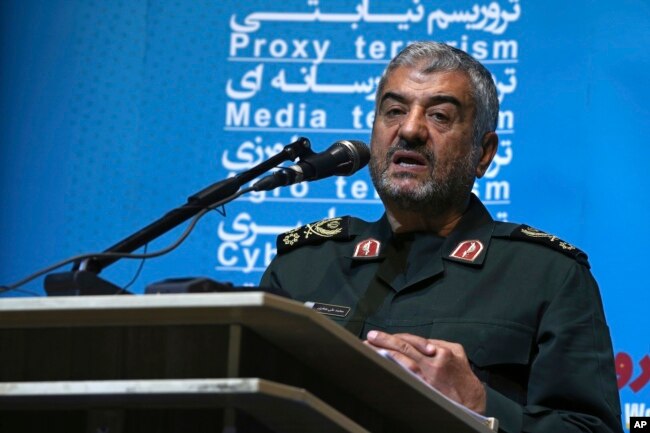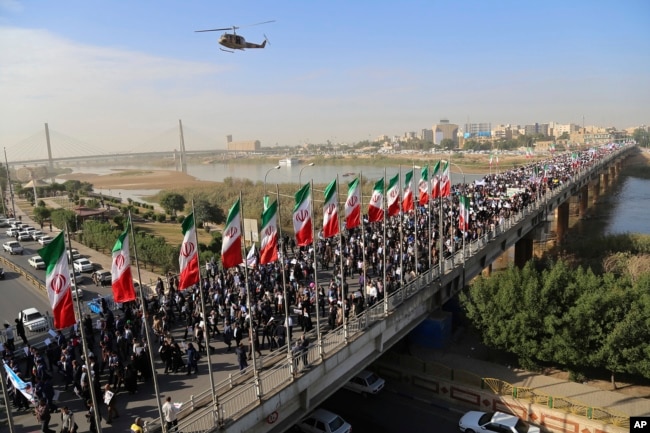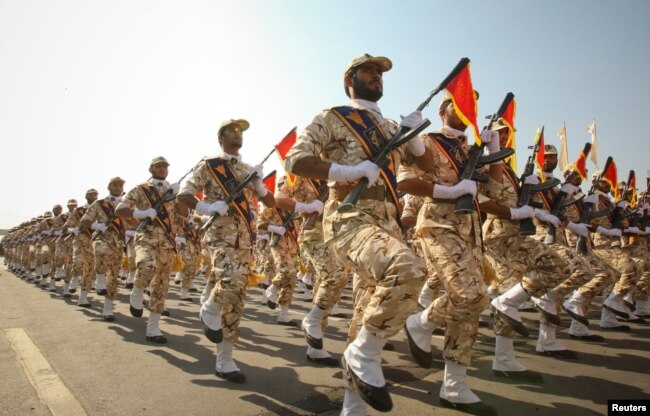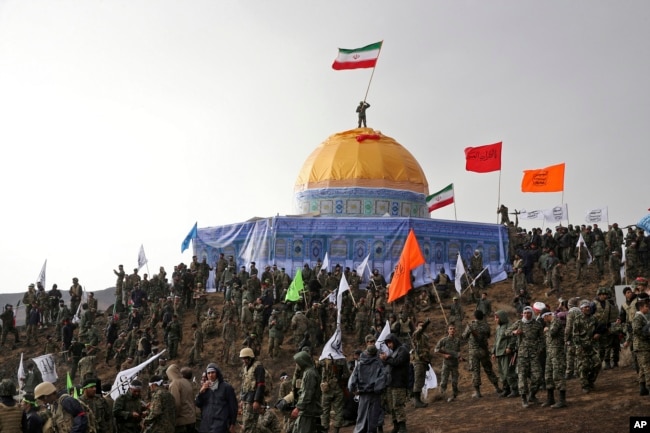VOA – The Iranian government has taken a lesson from the Arab Spring in responding to the worst anti-government protests the country has seen in nearly a decade.
Heavy-handed tactics by Arab governments against popular uprisings in 2011 led to the overthrow of regimes in Egypt and Libya and sparked a civil war in Syria.
Iran had its own Arab Spring-inspired demonstrations in 2011, but police deployed in relatively small numbers and refrained from using deadly force, leading the protests to die down.

FILE – The head of Iran’s paramilitary Revolutionary Guard, Gen. Mohammad Ali Jafari, speaks during a conference called “A World Without Terror,” in Tehran, Oct. 31, 2017.
Calls for end to protests
Mohammad Ali Jafari, commander of the powerful Islamic Republic Revolutionary Corps, recalled the Arab governments’ experience as he declared an end to the protests Wednesday.
“Our security preparation and public scrutiny allowed the enemy to be defeated again, because if our situation was like Egypt, Syria and Libya, the Islamic Republic of Iran would have suffered irreparable damage,” Jafari said, in comments carried by the IRGC’s news agency.
The Iranian government has been condemned for using harsh tactics to suppress the protests.
Still, its response is seen as relatively restrained, with analysts saying the regime is wary that taking harder measures could exacerbate the unrest to the point of threatening its existence.

In this photo provided by Mehr News Agency, demonstrators attend a pro-government rally in the southwestern city of Ahvaz, Iran, Jan. 3, 2018.
“They’ve seen what has happened elsewhere, when you go in heavy-handed as far as protests are concerned,” said Alex Vatanka, an Iran security expert with the American Enterprise Institute in Washington..
In contrast to their violent crackdown on demonstrators during the 2009 “green movement” protests, Iranian security forces have been relatively restrained during the most recent anti-government demonstrations, Vatanka said.
“This certainly has not been the bloodiest of events,” he said.
At least 21 people have died in clashes between security forces and protesters over the past week. In 2009, hundreds of protesters were killed and thousands jailed.

FILE – Members of the Iranian Revolutionary Guard march during a parade to commemorate the anniversary of the Iran-Iraq war (1980-88), in Tehran, Sept. 22, 2011.
The Revolutionary Guards
The Revolutionary Guards, which led the crackdown against protesters in 2009, have kept a relatively low profile over the past week.
The Guards, created in the aftermath of the 1979 Islamic Revolution, have a force of 150,000 enlisted fighters, according to one estimate.
Jafari said the Guards have deployed “limited numbers” of forces to three cities: Isfahan, Larestan and Hamadan.
A spokesman for the Guards said Tuesday that there had been no need to deploy forces in Tehran.
But behind the scenes, the Revolutionary Guards are “at the heart of it,” Vatanka said.
“I haven’t seen a single instance of a senior Revolutionary Guards commander at the street level,” Vatanka said. “That tells me they want to keep a distance, they sort of want to give the image that they’re watching, but they don’t think the time is right for them to move in.”

FILE – Members of the Basij, the paramilitary unit of Iran’s Revolutionary Guard, gather around a replica of Jerusalem’s gold-topped Dome of the Rock mosque as one of them waves an Iranian flag from on top of the dome during a military exercise, Nov. 20, 2015.
Basij paramilitary force
With the Revolutionary Guards staying on the sidelines, they have left it to the Basij paramilitary force to crack down on protesters.
Just how many Basij militiamen have been deployed remains unclear. Videos circulating on social media show uniformed and plain clothes Basij forces clashing with protesters in several cities. But they often have been seen behind police lines.
Deploying the all-volunteer “people’s militia” allows the government to inoculate itself against criticism for using force against demonstrators, Vatanka said.
“Because there is that distance between the Basij and the regime, the regime then likes to say, ‘This is not really us doing anything, this is the people, this is the good Samaritans of this country, acting in defense of their values and so forth,’” he said.
Riot police
Iranian riot police have been deployed in larger numbers, most recently to escort pro-government demonstrations held Wednesday.
The riot police officers are part of the Iranian national police’s Special Unit Forces and operate under the Ministry of the Interior.
National Police Commander Gen. Hossein Ashtari said Tuesday that “all police forces nationwide have been ordered to seriously deal with those threatening the lives of people or looters of public assets,” according to the Islamic Republic News Agency.
Videos on social media show confrontations between well-armed riot police officers and protesters in several cities. One police officer reportedly was killed in a confrontation in Isfahan on Monday.
But in other instances, police commanders have sought to engage protesters in dialogue. Protesters in turn have called on police to protect them against the Basij. In one video, protesters are heard chanting, “Police, help us to get rid of the IRGC and its Basij force.”
 Shabtabnews In this dark night, I have lost my way – Arise from a corner, oh you the star of guidance.
Shabtabnews In this dark night, I have lost my way – Arise from a corner, oh you the star of guidance.


